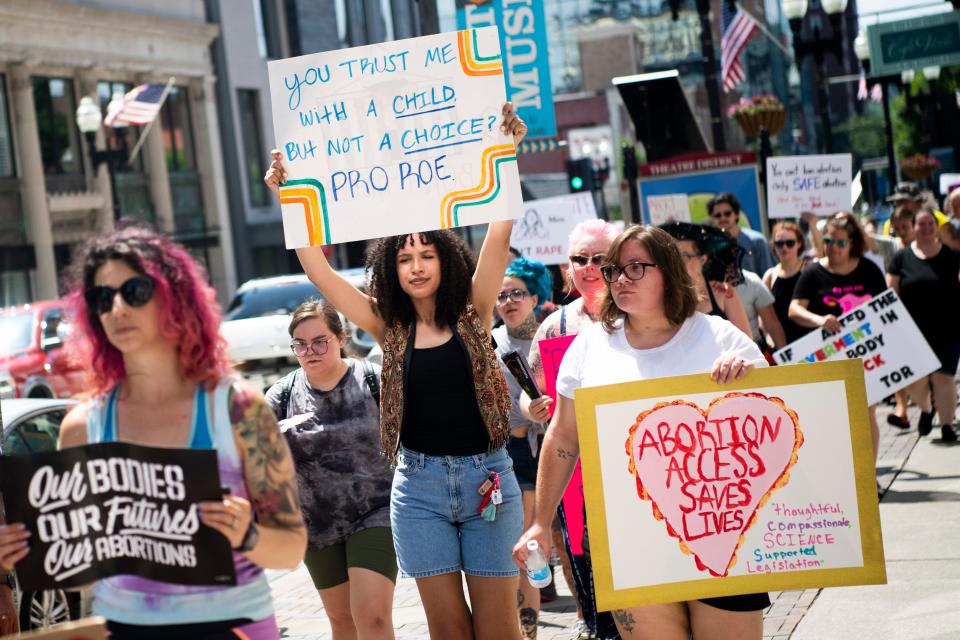Tennessee’s near-complete abortion ban is dangerous | Opinion
Tennessee's near-complete abortion ban is creating shockwaves throughout the health care provider community. Physicians, nurses and other health care providers are now confronted with untenable options when caring for people who are pregnant with serious and potentially life-threatening pregnancy complications.

The Tennessee abortion ban does not include exceptions for rape or incest. Nor does the law have an explicit exception to save a pregnant person’s life. The law does include an affirmative defense that requires the provider to justify an abortion was a necessary, lifesaving measure. However, instead of the idea of being innocent until proven guilty, an affirmative defense clause requires that the health care provider prove that an abortion was necessary to save the life of a mother. The affirmative defense is the opposite of convention when the state must prove the procedure was unnecessary to save a life. To avoid legal liability, health care providers are rethinking long-established interventions and the timing of these interventions to justify their actions as lifesaving.

The Tennessee abortion ban and the affirmative defense create a conflict between professional ethics, clinical standards and Tennessee law. The prospect of being charged with a Class C felony and the specter of up to 15 years in prison if the affirmative defense fails has chilling implications for health care providers, including nurses, which is our focus.
Maternal implications
People who are pregnant could potentially lose access to medically necessary care in certain emergent situations. Classic examples illustrating the extreme nature of Tennessee's ban include ectopic pregnancies (because Tennessee’s law defines pregnancy as embryonic and fetal life within a body and not within the uterus) and imminent miscarriages.
Hear more Tennessee voices:Get the weekly opinion newsletter for insightful and thought-provoking columns.
An ectopic pregnancy occurs when a fertilized egg grows outside the uterus, typically in a fallopian tube. A fetus is not viable in an ectopic pregnancy. The consequences of not providing care to a person with an ectopic pregnancy are dire and can include maternal death if the pregnancy is not terminated. However, treatment is now illegal under the current law, and the burden of proving the treatment was necessary to save a life rests with the health care provider.

Most miscarriages, defined as fetal loss before 20 weeks of pregnancy, occur in the first trimester when the fetus is not viable. The standard of care for miscarriages is to administer medications or surgically remove retained fetal and placental parts to address bleeding and infection, which can be life-threatening if untreated. The Tennessee abortion ban increases the chances that treatment will not be offered or will be offered later than is prudent.
In addition, the U.S. has poor maternal outcomes relative to comparable countries. Abortion bans are expected to increase pregnancy-related deaths up to 24% overall and 39% for Black women. The expected increases are alarming given the current maternal mortality rates in the U.S., among Black women and in Tennessee. The U.S. had the highest maternal mortality rate in 2020, 23.8 deaths per 100,000 live births, compared to similarly developed countries. The rate for the country ranked second worst, France, was 8.7.
Furthermore, the maternal mortality rate among Black women in the U.S. is 55.0 per 100,000 live births, almost three times greater than for white women (19.0). In addition, contrary to trends in other countries, maternal mortality rates are rising. One of the tragedies is that the vast majority of those deaths are preventable.
Nursing implications
In Tennessee, only physicians may perform abortions or prescribe medication to terminate a pregnancy. However, nurses and other health care team members provide care, including abortion care, to pregnant people. Nurses' involvement raises the possibility of nurses being charged with a crime. This raises many concerns for nurses, particularly those in emergency departments and obstetric and surgical departments.
Another professional imperative is to reduce disparities among different population groups. The Tennessee abortion ban puts nurses in an untenable position by creating conflict between navigating the implications of the Tennessee law and meeting professional, ethical obligations to provide the best possible care to all people.
The Tennessee abortion ban needs to change. The current law, passed in 2019, was triggered by the Supreme Court reversal of Roe v. Wade in 2022. A prominent state senator said when he voted yes on the state's abortion ban, he did not anticipate that Roe v. Wade would be overturned. The same senator and other state legislators are now proposing limited exceptions to the Tennessee abortion ban. The move to add limited exceptions is consistent with 75% of registered voters recently polled who think abortions should be legal in cases involving incest and rape and to save the life of a pregnant person.
We encourage state legislators at a minimum to allow exceptions for rape, incest, saving the life of a mother and for the provision of necessary care. The affirmative defense that impedes the delivery of safe and quality health care without the threat of prosecution should be removed.
Carole R. Myers, Ph.D., R.N., is professor emerita at the University of Tennessee College of Nursing. Tracey Stansberry, Ph.D., APRN, AOCN, is a lecturer at the University of Tennessee.
This article originally appeared on Knoxville News Sentinel: Opinion: Tennessee’s near-complete abortion ban is dangerous

